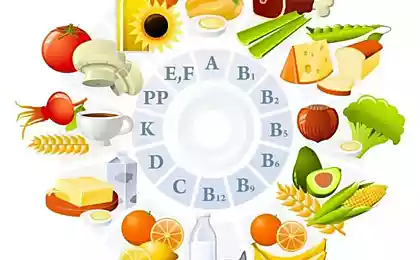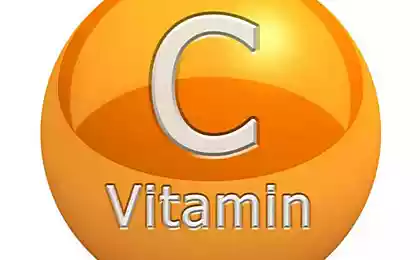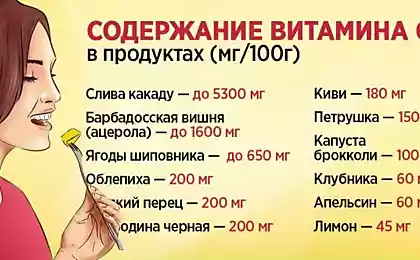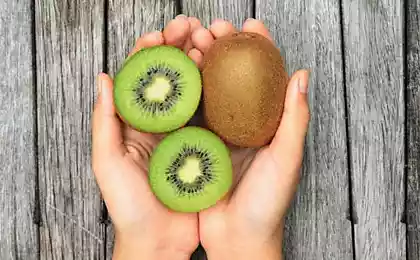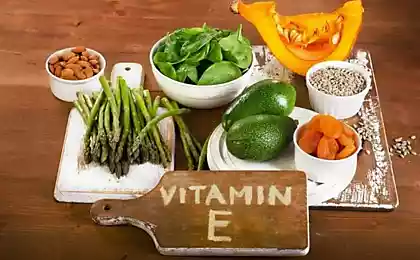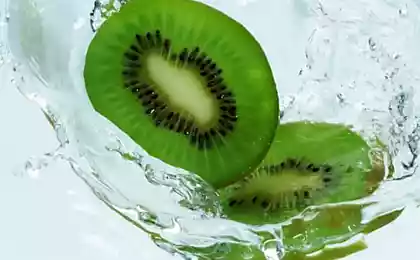541
Kiwi — another storehouse of vitamin C
Kiwi is one of the most delicious fruit and contain a lot of healthy phytochemicals, vitamins and minerals. These fruits have their origin in the Chinese province of Shaanxi. Kiwifruit is a subtropical fruit. They belong to the family Actinidiaceae, the genus Actinidia. Their scientific name is Actinidia chinensis.
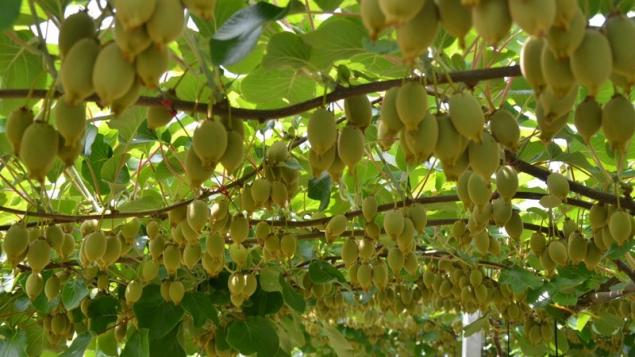
Their scientific name is Actinidia chinensis. In the early 20th century seeds of these fruits were brought by missionaries to New Zealand, where they settled down. New Zealand began the distribution of these, like sweet red pepper and lemon, rich in vitamin C, fruits around the world.
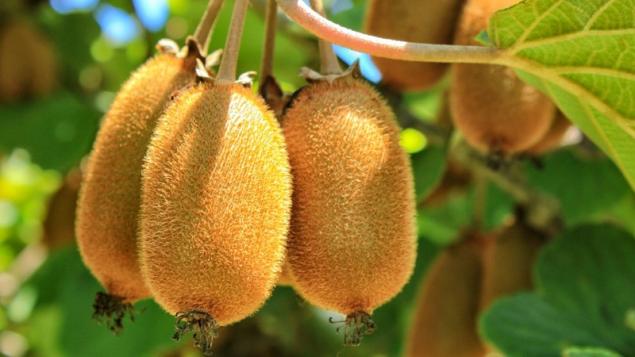
Currently, they are grown in Europe and California (USA). On resource Nutrition And You much said about what can be useful, the fruit the human body. From September to November, the kiwi vine bears fruit a brownish oval fruit. The size of the fruit of the kiwi around with a chicken egg and weighs about 125 grams. It has a soft, juicy flesh is emerald green with small black edible seeds.
In texture the flesh of the kiwi is reminiscent of strawberries and Sapodilla. The taste is something between the strawberries and pineapple.
In addition to the common green kiwi fruit grown other varieties of fruit — hardy (A. arguta), also known as "baby kiwi". They are much smaller in size than regular kiwi. Every fruit the size of a large grape and has a smooth edible skin. Color and texture, this variety resembles a regular kiwi, but has a more pronounced flavor and sweetness.
"Golden kiwi" (Gold Kiwifruit) grown by hybrid technology the Department of agricultural research in New Zealand. This variety is characterized by fuzzy skin bronze-colored, speckled "cap" at one end and Golden-yellow flesh, which is less tart than regular kiwi, and has a more pronounced tropical flavor. This variety is considered more valuable in the market than ordinary green kiwifruit.
Use kiwi for health
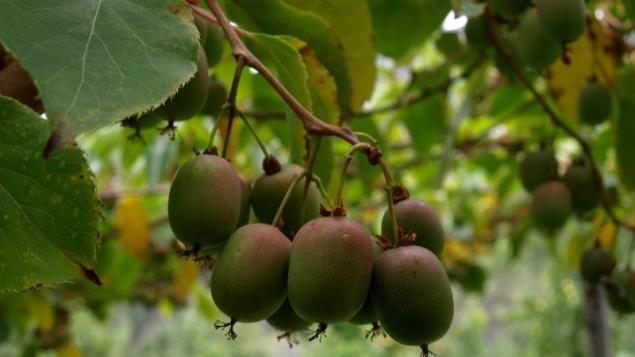
Kiwi fruit is moderately high in calories and in this respect comparable to the grapes. The energy value of kiwifruit is 61 calories per 100 grams. These fruits contain antioxidants, vitamins, minerals and dietary fiber.
Kiwis are a good source of dietary fiber (3.8 grams per 100 grams, which is 10% of the recommended daily value of consumption) that makes it good laxative. Contained in foods of dietary fiber protects the mucous membrane of the colon, reducing the duration of exposure to toxins, and linking it to carcinogenic chemicals.
Kiwifruit are an excellent source of antioxidant vitamin C, providing 154% of the daily norm of consumption of this essential vitamin. Eating foods rich in vitamin C, promotes the body's resistance to pathogens and removes harmful free radicals.
In significant amounts in kiwi fruit also contains vitamins A, E, K and flavonoid antioxidants — beta-carotene, lutein and xanthine. Vitamin K presumably plays a role in the formation of bone mass, promoting osteotropic activity in the bones. It was also established its role in the treatment of patients with Alzheimer's disease, since this vitamin reduces damage to neurons in the brain damage. The total antioxidant value (ORAC) raw Golden kiwi is 1210 µmol TE / 100 grams.
During the research it was observed that certain chemicals in kiwi, like aspirin, contribute to the thinning of the blood. Thus they help to prevent blood clots in blood vessels and can prevent stroke and heart attack.
Consider the fruits are also a great source of omega-3. Studies have shown that consuming foods rich in omega-3 may reduce the risk of coronary heart disease, stroke and help prevent the development of attention deficit disorder and hyperactivity, autism and other developmental disorders in children.
Fresh kiwifruit is a very rich source of healthy heart healthy electrolyte potassium. 100 grams of kiwi contain 312 mg of potassium, 7 percent of the recommended daily norms of consumption of the electrolyte. Potassium is an important component of cells and fluids of the body that helps regulate heart rate and blood pressure, eliminating the harmful effect of sodium.
Kiwi also contain appreciable amounts of minerals such as manganese, iron and magnesium. Manganese is used by the body as a factor associated with powerful antioxidant enzyme superoxiddismutase. Magnesium, like calcium, needed for strong bones.
Caution
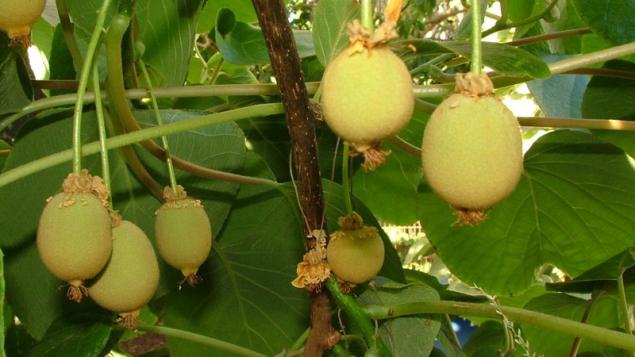
Allergic reactions to kiwi are rare. Children and pregnant women should eat kiwi fruit eaten with caution.
Nutritional value of kiwi
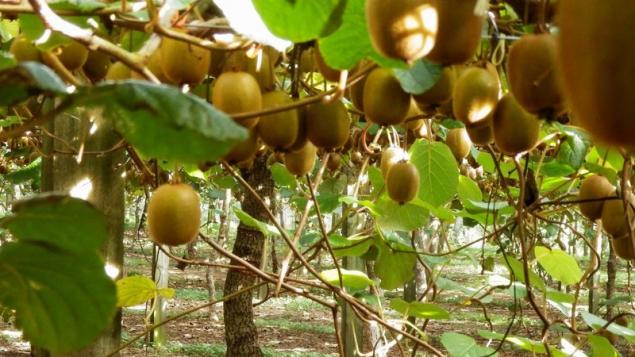
In parentheses are the percentage of the daily allowance. Nutritional value is based per 100 grams of fresh kiwi green according to information from the Ministry of agriculture of the USA, shown in the resource Nutrition And You.
General information:
the energy value is 61 calories (3%);
carbohydrates — of 14.66 grams (11%);
protein — 1 gram (2%);
fats — 0.52 grams (2%);
fiber, part of the food — 3 grams (8%).
Vitamins:
folic acid (vitamin B9) — 25 micrograms (6%);
nicotinic acid (vitamin B3) — 0,341 milligrams (2%);
Riboflavin (vitamin B2) — 0.025 milligrams (2%);
thiamine (vitamin B1) of 0.027 mg (2%);
vitamin A — 87 international units (IU, IU) is 3%;
vitamin C and 92.7 milligrams (154%);
vitamin E 1.46 mg (10%);
vitamin K — the 40.3 micrograms (34%).
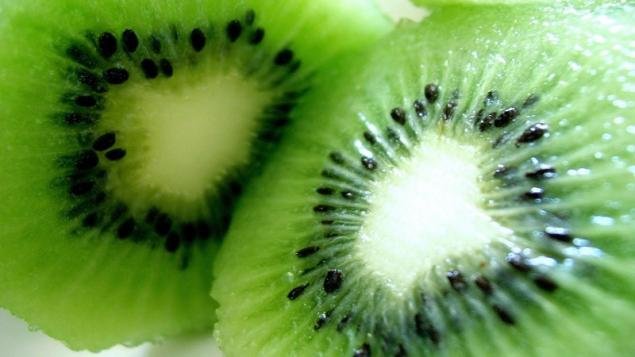
Electrolytes:
sodium — 3 milligrams (~0%);
potassium 312 mg (7%).
Minerals:
calcium — 34 mg (3,5%);
copper — 0,130 mg (14%);
iron — 0.31 mg (4%);
magnesium — 17 mg (4%);
manganese — 0,098 mg (4%);
zinc 0.14 mg (1%).
Phytonutrients:
beta-carotene (ß-carotene) is 52 micrograms;
beta-cryptoxanthin (ß-cryptoxanthin) — 0 micrograms;
lutein-zeaxanthin — 122 micrograms.published
P. S. And remember, only by changing their consumption — together we change the world! © Join us at Facebook , Vkontakte, Odnoklassniki
Source: hi-news.ru

Their scientific name is Actinidia chinensis. In the early 20th century seeds of these fruits were brought by missionaries to New Zealand, where they settled down. New Zealand began the distribution of these, like sweet red pepper and lemon, rich in vitamin C, fruits around the world.

Currently, they are grown in Europe and California (USA). On resource Nutrition And You much said about what can be useful, the fruit the human body. From September to November, the kiwi vine bears fruit a brownish oval fruit. The size of the fruit of the kiwi around with a chicken egg and weighs about 125 grams. It has a soft, juicy flesh is emerald green with small black edible seeds.
In texture the flesh of the kiwi is reminiscent of strawberries and Sapodilla. The taste is something between the strawberries and pineapple.
In addition to the common green kiwi fruit grown other varieties of fruit — hardy (A. arguta), also known as "baby kiwi". They are much smaller in size than regular kiwi. Every fruit the size of a large grape and has a smooth edible skin. Color and texture, this variety resembles a regular kiwi, but has a more pronounced flavor and sweetness.
"Golden kiwi" (Gold Kiwifruit) grown by hybrid technology the Department of agricultural research in New Zealand. This variety is characterized by fuzzy skin bronze-colored, speckled "cap" at one end and Golden-yellow flesh, which is less tart than regular kiwi, and has a more pronounced tropical flavor. This variety is considered more valuable in the market than ordinary green kiwifruit.
Use kiwi for health

Kiwi fruit is moderately high in calories and in this respect comparable to the grapes. The energy value of kiwifruit is 61 calories per 100 grams. These fruits contain antioxidants, vitamins, minerals and dietary fiber.
Kiwis are a good source of dietary fiber (3.8 grams per 100 grams, which is 10% of the recommended daily value of consumption) that makes it good laxative. Contained in foods of dietary fiber protects the mucous membrane of the colon, reducing the duration of exposure to toxins, and linking it to carcinogenic chemicals.
Kiwifruit are an excellent source of antioxidant vitamin C, providing 154% of the daily norm of consumption of this essential vitamin. Eating foods rich in vitamin C, promotes the body's resistance to pathogens and removes harmful free radicals.
In significant amounts in kiwi fruit also contains vitamins A, E, K and flavonoid antioxidants — beta-carotene, lutein and xanthine. Vitamin K presumably plays a role in the formation of bone mass, promoting osteotropic activity in the bones. It was also established its role in the treatment of patients with Alzheimer's disease, since this vitamin reduces damage to neurons in the brain damage. The total antioxidant value (ORAC) raw Golden kiwi is 1210 µmol TE / 100 grams.
During the research it was observed that certain chemicals in kiwi, like aspirin, contribute to the thinning of the blood. Thus they help to prevent blood clots in blood vessels and can prevent stroke and heart attack.
Consider the fruits are also a great source of omega-3. Studies have shown that consuming foods rich in omega-3 may reduce the risk of coronary heart disease, stroke and help prevent the development of attention deficit disorder and hyperactivity, autism and other developmental disorders in children.
Fresh kiwifruit is a very rich source of healthy heart healthy electrolyte potassium. 100 grams of kiwi contain 312 mg of potassium, 7 percent of the recommended daily norms of consumption of the electrolyte. Potassium is an important component of cells and fluids of the body that helps regulate heart rate and blood pressure, eliminating the harmful effect of sodium.
Kiwi also contain appreciable amounts of minerals such as manganese, iron and magnesium. Manganese is used by the body as a factor associated with powerful antioxidant enzyme superoxiddismutase. Magnesium, like calcium, needed for strong bones.
Caution

Allergic reactions to kiwi are rare. Children and pregnant women should eat kiwi fruit eaten with caution.
Nutritional value of kiwi

In parentheses are the percentage of the daily allowance. Nutritional value is based per 100 grams of fresh kiwi green according to information from the Ministry of agriculture of the USA, shown in the resource Nutrition And You.
General information:
the energy value is 61 calories (3%);
carbohydrates — of 14.66 grams (11%);
protein — 1 gram (2%);
fats — 0.52 grams (2%);
fiber, part of the food — 3 grams (8%).
Vitamins:
folic acid (vitamin B9) — 25 micrograms (6%);
nicotinic acid (vitamin B3) — 0,341 milligrams (2%);
Riboflavin (vitamin B2) — 0.025 milligrams (2%);
thiamine (vitamin B1) of 0.027 mg (2%);
vitamin A — 87 international units (IU, IU) is 3%;
vitamin C and 92.7 milligrams (154%);
vitamin E 1.46 mg (10%);
vitamin K — the 40.3 micrograms (34%).

Electrolytes:
sodium — 3 milligrams (~0%);
potassium 312 mg (7%).
Minerals:
calcium — 34 mg (3,5%);
copper — 0,130 mg (14%);
iron — 0.31 mg (4%);
magnesium — 17 mg (4%);
manganese — 0,098 mg (4%);
zinc 0.14 mg (1%).
Phytonutrients:
beta-carotene (ß-carotene) is 52 micrograms;
beta-cryptoxanthin (ß-cryptoxanthin) — 0 micrograms;
lutein-zeaxanthin — 122 micrograms.published
P. S. And remember, only by changing their consumption — together we change the world! © Join us at Facebook , Vkontakte, Odnoklassniki
Source: hi-news.ru

